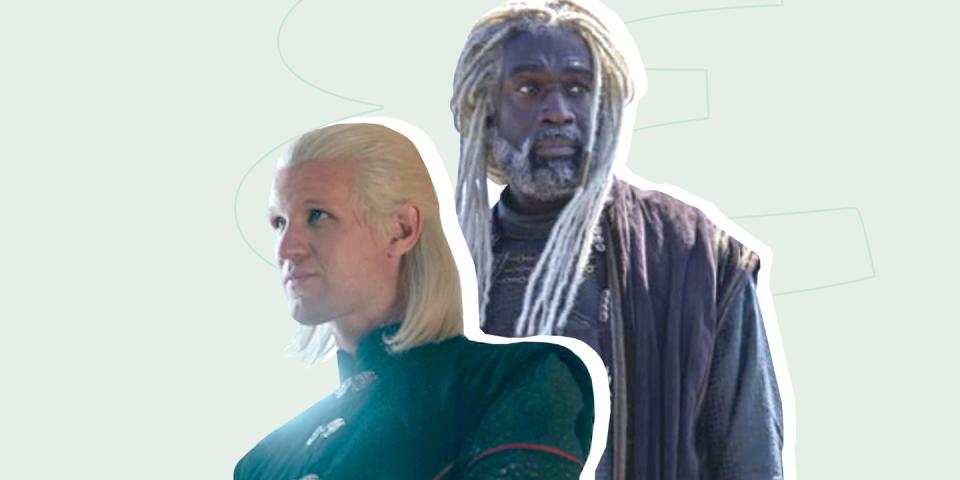'House of the Dragon' Fans Have Noticed a Very Important 'Game of Thrones' Inconsistency
- Oops!Something went wrong.Please try again later.
- Oops!Something went wrong.Please try again later.
- Oops!Something went wrong.Please try again later.

Everyone and their dog watched the premiere episode of House of the Dragon, HBO's Game of Thrones prequel. But did you (or your dog!) catch the not-so-subtle references to the original series?
Focusing on the "Age of Dragons," a period of time in Westeros when the Targaryen family reigned, House of the Dragon occurs roughly 200 years before Game of Thrones begins. The series makes note of the chronology in the opening, stating that our story begins "before the death of the mad king, Aerys, and the birth of his daughter, Princess Daenerys Targaryen." However, some fans believe that the nod wasn't meant to connect the new series to Game of Thrones, but to George R.R. Martin's original novels, A Song of Ice and Fire.
Viserys Targaryen name dropping “A Song of Ice and Fire” to Rhaenyra Targaryen, in the premiere no less, is the last thing I expected, and has my hype for this series skyrocketed. 10/10 premiere. #HouseoftheDragon #HOTD #HouseOfTheDragonHBO pic.twitter.com/LAcmo2tmOk
— Chris Montes (@chrismont3s) August 21, 2022
At the end of the premiere episode, King Viserys Targaryen has a talk with his daughter, Princess Rhaenyra. Viserys informs her that he intends to name her his heir to the throne, and he shares with her an apocalyptic prophecy passed down by five generations of Targaryen rulers. According to Viserys, the legendary Aegon "the Conqueror" Targaryen had a vision that foretold of a terrible winter, and an enemy that could only be defeated if a Targaryen united the Seven Kingdoms of Westeros. Aegon allegedly titled the prophetic dream, "A Song of Ice and Fire."
Related video: Get ready for 'House of the Dragon'
This reference—possibly just a way to connect House of the Dragon to the events of Thrones even further—just created more questions. Viewers may remember that at the end of Thrones, Samwell Tarly tied the series up in a nice little bow by naming his written account of events A Song of Ice and Fire. Tarly later states that he came up with the name himself. Game of Thrones never mentions Aegon's prophesy, however, and Daenerys also seemed to have no knowledge of it in the show either. Is this believed inconsistency merely a way for fans to retcon the last two seasons of Game of Thrones, or is this the honest truth from the House of the Dragon team as well?
The theory may have legs to stand on. In an interview with Vanity Fair, showrunner Ryan Condal confirmed that the idea of Aegon's prophecy came from the writer himself. In the novels, Daenerys has a vision in the House of the Undying that mentions Aegon's dream. Though this wasn't depicted in Game of Thrones, she hears a voice belonging to her late brother Rhaegar, that says, "Aegon. What better name for a king… He is the prince that was promised, and his is the Song of Ice and Fire."
A Song of Ice and Fire. #HOTD pic.twitter.com/aeBGJJwFRl
— House of the Dragon (@HouseofDragon) August 22, 2022
In hindsight, the statement all but points to Jon Snow. He has yet to be resurrected in the books (an insane cliffhanger for Martin to have left us on for so many years!) but Thrones eventually reveals that Jon is actually Rhaegar Targaryen's son, Aegon. Martin also claimed that he intends to incorporate the prophecy into The Winds of Winter—should he ever finish writing!—which will also have a "very different" ending." Is this his way of adding new ideas to a series decades in the making, or is the prophecy's title a way to separate his work from Thrones' underwhelming conclusion?
"What we're doing at this point in the history of A Song of Ice and Fire... we have two canons," author George R.R. Martin stated in a live-streamed video. "The show (Game of Thrones) canon, and the book (The Song of Ice and Fire) canon." For fans of the series, it's a welcome distinction. Though it's nearly impossible to view the new prequel series as anything but a follow-up to HBO's Thrones, the theory allows for audiences to technically watch House of the Dragon as a prequel to the beloved novels instead. Works for me. Whatever it takes to erase Game of Thrones's ending from our minds!
You Might Also Like

